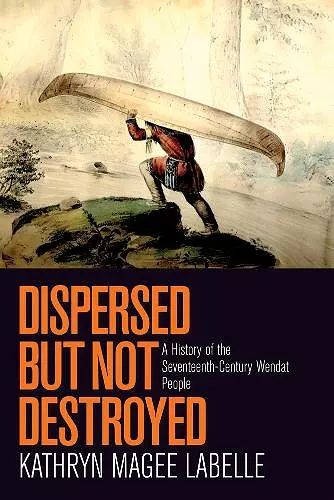Dispersed but Not Destroyed
A History of the Seventeenth-Century Wendat People
Format:Hardback
Publisher:University of British Columbia Press
Published:29th Apr '13
Currently unavailable, and unfortunately no date known when it will be back

A beautifully written tale of struggle, dispersal, and survival that turns the story of the Wendat conquest on its head.
Through the prisms of leadership, women, and power, this book traces the Wendat diaspora beyond a discourse of destruction and into a new world of rejuvenation and hope.
Situated within the area stretching from Georgian Bay in the north to Lake Simcoe in the east, the Wendat Confederacy flourished for two hundred years. By the mid-seventeenth century, however, Wendat society was under attack. Disease and warfare plagued the people, culminating in a series of Iroquois assaults that led to their ultimate dispersal.
Yet the Wendat did not disappear, as many historians have maintained. In Dispersed but Not Destroyed, Kathryn Magee Labelle examines the creation of a Wendat diaspora in the wake of the Iroquois attacks. In the latter half of the century, Wendat leaders continued to appear at councils, trade negotiations, and diplomatic ventures, relying on established customs of accountability and consensus. Women also continued to assert their authority during this time, guiding their communities toward paths of cultural continuity and accommodation. Turning the story of Wendat conquest on its head, this book demonstrates the resiliency of the Wendat people and writes a new chapter in North American history.
… the devastating Haudenosaunee attacks in 1649 have long shaped the ways scholars have narrated and understood the past of the Wendat people … So dramatic was this dispersal that many historians and anthropologists have portrayed it as the end of Wendat history and any meaningful Wendat peoplehood. Kathryn Magee Labelle forcefully challenges, and convincingly demolishes, this “discourse of destruction” (p. 196) in her aptly-named Dispersed but Not Destroyed … A topnotch ethnohistory, Labelle’s book … draws a complex yet coherent picture of the vibrant Wendat diaspora. At the same time it prompts broader questions about power, society, and narrative in the study of seventeenth-century North America.
-- Sami Lakomäki, University of Oulu * Histoire sociale / Social History *A nuanced and highly readable account of the Wendat people’s turbulent history, which challenges the notion of the Wendat’s disappearance as a cohesive community in the wake of the Iroquois attacks of the mid-seventeenth century. -- Roger M. Carpenter, Department of History, University of Louisiana Mo
- Winner of John A. Ewers Award, Western History Association 2014 (United States)
- Winner of CSN-REC Book Prize, Canadian Studies Network – Réseau d’études canadiennes 2013 (Canada)
- Short-listed for Aboriginal History Prize, Canadian Historical Association 2014 (Canada)
- Short-listed for Sir John A. Macdonald Prize, Canadian Historical Association 2014 (Canada)
ISBN: 9780774825559
Dimensions: unknown
Weight: 550g
288 pages